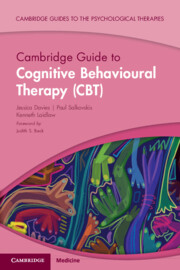Book contents
- Cambridge Guide to Cognitive Behavioural Therapy (CBT)
- Cambridge Guides to the Psychological Therapies
- Reviews
- Cambridge Guide to Cognitive Behavioural Therapy (CBT)
- Copyright page
- Contents
- Foreword
- A Note from the Series Editor
- Part I An Overview of the Model
- Chapter 1 An Historical Overview of Cognitive Behavioural Therapy
- Chapter 2 The Supporting Theory of Cognitive Behavioural Therapy
- Chapter 3 Efficacy of CBT: A Brief Outline and Review
- Part II Putting the Model of Cognitive Behavioural Therapy into Practice
- Part III Application and Adaptations for Mental Health Presentations
- Part IV Application of Cognitive Behavioural Therapy in Different Populations and Settings
- Index
- References
Chapter 2 - The Supporting Theory of Cognitive Behavioural Therapy
from Part I - An Overview of the Model
Published online by Cambridge University Press: 18 November 2025
- Cambridge Guide to Cognitive Behavioural Therapy (CBT)
- Cambridge Guides to the Psychological Therapies
- Reviews
- Cambridge Guide to Cognitive Behavioural Therapy (CBT)
- Copyright page
- Contents
- Foreword
- A Note from the Series Editor
- Part I An Overview of the Model
- Chapter 1 An Historical Overview of Cognitive Behavioural Therapy
- Chapter 2 The Supporting Theory of Cognitive Behavioural Therapy
- Chapter 3 Efficacy of CBT: A Brief Outline and Review
- Part II Putting the Model of Cognitive Behavioural Therapy into Practice
- Part III Application and Adaptations for Mental Health Presentations
- Part IV Application of Cognitive Behavioural Therapy in Different Populations and Settings
- Index
- References
Summary
This chapter acts as a clear guide to your theoretical understanding of CBT to enhance your knowledge across protocols, clinical populations and clinical presentations.
You will gain a working knowledge of the theoretical basis of Beck’s model CBT and how theories and models remain important for advancing clinical practice.
You will be able to more effectively apply CBT across protocols as you will have a better elaborated account of how this therapy has integrated elements across conditions and client presentations.
You will become knowledgeable about the theoretical mechanism of change in CBT
You will become more skilled in using theoretical principles of CBT to stay true to execution of treatment protocols.
Keywords
Information
- Type
- Chapter
- Information
- Cambridge Guide to Cognitive Behavioural Therapy (CBT) , pp. 10 - 21Publisher: Cambridge University PressPrint publication year: 2025
References
Further Reading
The following sources provide more in-depth coverage of topics raised in this chapter.
Relatively recent papers by Beck summarising CBT theory and models:
The authoritative text summarising the theoretical basis for CBT presented definitively in Beck’s own words. A must-read book for all CBT therapists.
